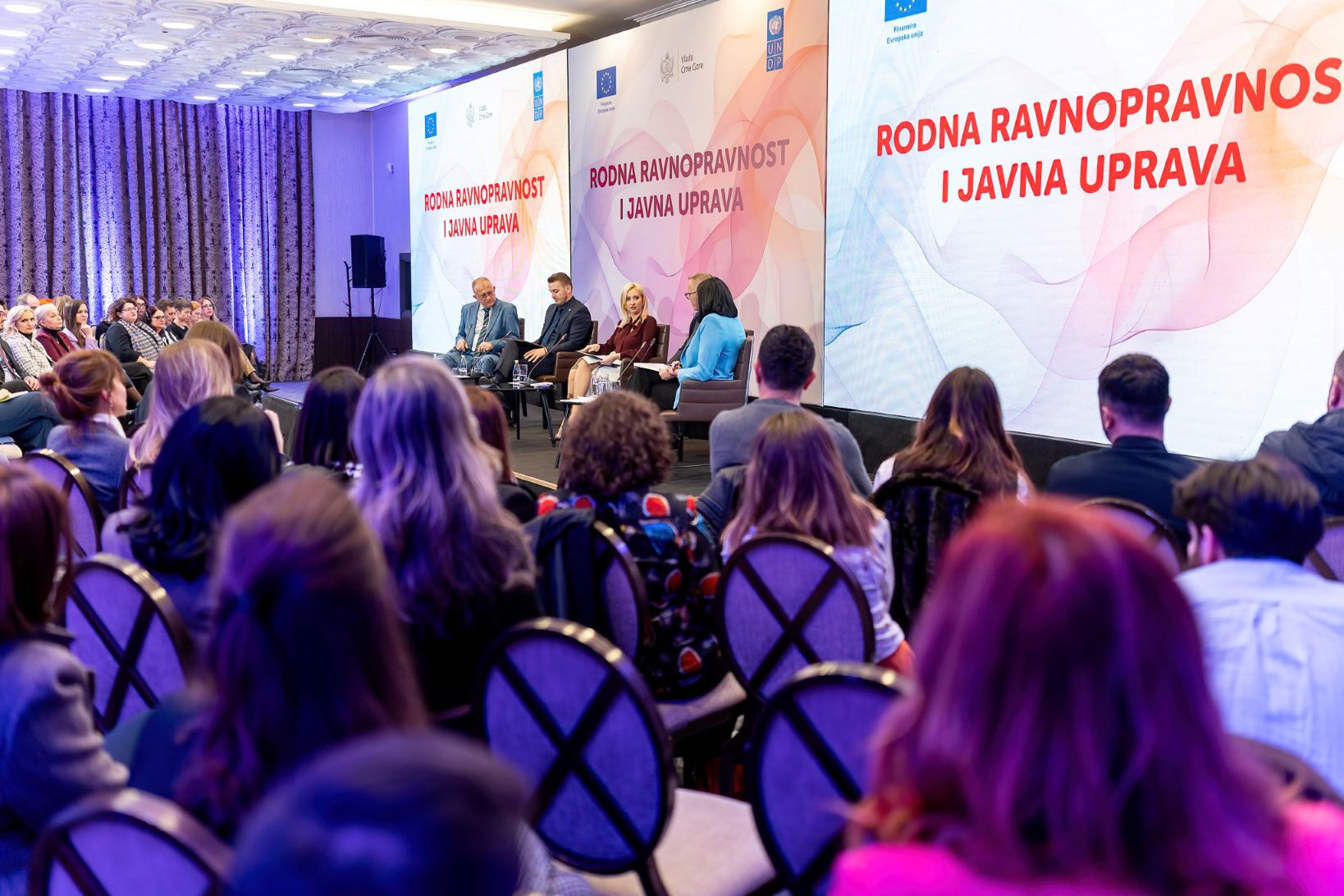
Podgorica, December 6, 2024 – Gender equality is a fundamental human right and an essential component of sustainable governance. Therefore, it is crucial to continuously ensure that the policy-making process in public administration aligns with gender-responsive standards. Transforming public administration lays the groundwork for more efficient resource management and equal opportunities for all citizens, fostering long-term changes with tangible impacts on society as a whole.
This was the key message of the event “Gender Equality and Public Administration” organized by the United Nations Development Programme (UNDP) in Montenegro to promote dialogue on gender-responsive policies and explore challenges and opportunities for transforming public administration by integrating a gender perspective into policymaking.
The event highlighted that Montenegro’s path to EU membership requires the systemic integration of gender equality as a core principle of democratic governance. Public institutions play a crucial role in promoting inclusive development and must adopt gender-responsive approaches to ensure governance structures reflect the needs and rights of all individuals.
“The UNDP 2024 Trends Report emphasizes that progress on Sustainable Development Goal 5, which pertains to gender equality, remains critically slow, with no single indicator fully achieved at the global level. At UNDP, we view gender equality as both a fundamental human right and the cornerstone of sustainable development. Societies that embrace gender equality demonstrate better governance, stronger economies, and more inclusive developmental pathways. Over the past several years, in partnership with the Government of Montenegro, we have supported the development of gender-responsive policies, capacity-building initiatives, and institutional frameworks aligned with EU and global standards. For us, achieving gender equality is not merely a matter of formal compliance but about building a society where everyone has the opportunity to thrive, and individuals – both women and men – can realize their full potential” said Ekaterina Paniklova, UNDP Resident Representative in Montenegro.
“Gender equality is one of the fundamental values of the EU, a requirement in the accession process, the foundation of efficient public administration, and, dare I say, the only way to ensure that public policies and budgets address the needs of all citizens equally. Moving forward means ensuring that the administration adopts gender-responsive practices and that civil servants are prepared to understand and implement them. We are at a pivotal moment that presents an opportunity, as the Ministry of Public Administration is working on the 2025-2026 action plan. Special attention must be given to integrating gender aspects when planning and implementing measures. We will remain dedicated to supporting the implementation of these measures and assisting public administration in becoming a model of fairness and inclusivity, where gender equality is not just an aspiration but a reality”, stated Liselotte Isaksson, Deputy Head of the Cooperation Sector at the EU Delegation to Montenegro.
The Minister of Public Administration, Marash Dukaj, identified challenges in implementing gender-responsive policies, highlighting the importance of cooperation and support in incorporating gender principles into all segments of institutional work. “We face challenges such as insufficient capacity, stereotypes, and a lack of tools for implementing gender equality policies. However, we are resolutely working on transformation. A pilot project with the Human Resources Administration to introduce an institutional standard for gender equality, based on global UNDP methodology, marks a new beginning for our public administration”, emphasized Dukaj.
The Minister of European Affairs, Maida Gorčević, underscored the importance of institutional transformation regarding gender equality in the context of European integration. “Gender equality is not just about aligning with European Union policies; it is also an opportunity for Montenegro to demonstrate leadership in the region. It is our responsibility to embed gender principles into all aspects of governance while building a future where equality becomes a reality for everyone”, Gorčević emphasized.
The Director of the Human Resources Administration, Agron Camaj, stated that change always begins with people. “As an institution with a key responsibility in human resource management, we have the opportunity to be drivers of change. In this mission, we aim to inspire other state administration bodies and join forces to collectively build the foundations of gender equality and a fair and just society”, he added.
Highlighting the need for continuous education and progress monitoring, the Director of the Institute for Standardization, Zoran Glomazić, drew attention to the importance of international standards for institutionalizing gender equality. “Standardization enables the creation of clear and binding procedures that ensure gender-responsive practices are not just declarative but become part of the everyday work of public administration”, Glomazić stated.
The Deputy Secretary General of the Government, Irena Vućić Popović, emphasized the importance of investing in human resources and institutional capacities. “There is no better investment than investing in human resources. By building a network of competent experts in gender equality, we create sustainable foundations for future generations and ensure that gender equality becomes permanently embedded in our governance system”, said Vućić Popović.

The conclusions of the conference reinforced the call for greater inter-institutional cooperation, strengthening the capacities of public officials, and implementing gender-responsive standards across all sectors. The need to develop accountability mechanisms and measurable outcomes was particularly emphasized to ensure that public policies genuinely address the needs of all citizens.
The conference is part of the project “United in Gender Equality”, implemented by UNDP and funded by the European Union.

 Locations
Locations







